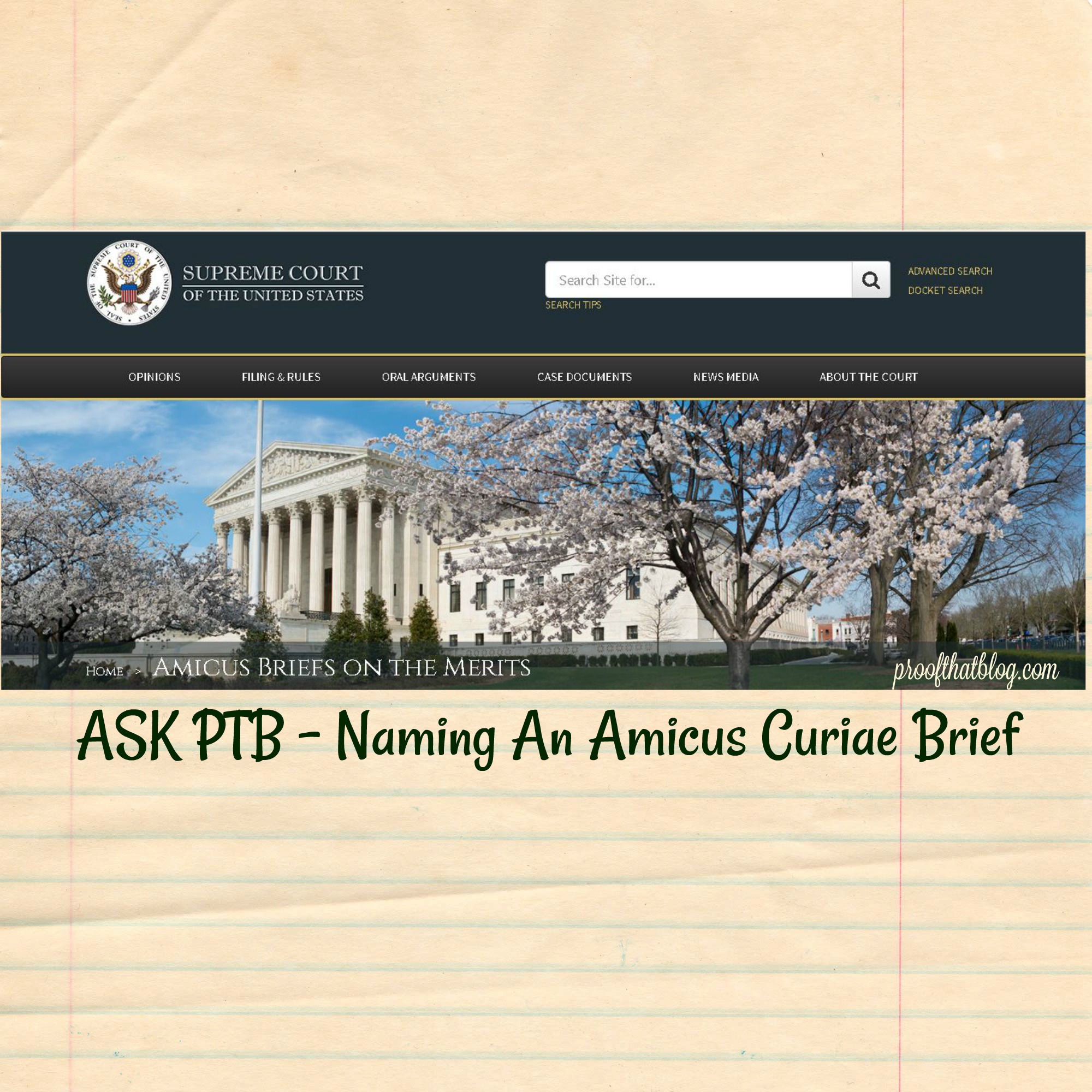 A reader used the Ask PTB page and asked “I’ve heard that the proper title for an amicus curiae brief is: ‘Brief Amicus Curiae for the Better Business Bureau’ (rather than ‘Amicus Curiae Brief for the Better Business Bureau’). Is that correct?”
A reader used the Ask PTB page and asked “I’ve heard that the proper title for an amicus curiae brief is: ‘Brief Amicus Curiae for the Better Business Bureau’ (rather than ‘Amicus Curiae Brief for the Better Business Bureau’). Is that correct?”
In researching the issue, I assumed the question was about filing an amicus curiae brief in the United States Supreme Court. The short answer is that there is no standard.
Rule 37 of the Rules of Supreme Court of United States (“Supreme Court Rules”) sets forth the requirements for an amicus curiae brief to the U.S Supreme Court but doesn’t mention special requirements for naming the brief.
Here are examples of some of the titles of amicus curiae briefs I found:
- Brief for an Amicus Curiae in Support of the Plaintiff, Petitioner, or Appellant, or in Support of Neither Party, on the Merits or in an Original Action at the Exceptions Stage
- Brief for an Amicus Curiae in Support of the Defendant, Respondent, or Appellee, on the Merits or in an Original Action at the Exceptions Stage
There was mention that the requirements for the cover page of a Supreme Court brief are covered in Rule 34.1 of the Supreme Court Rules and it does apply to amicus curiae briefs. Those rules set forth that the cover page must specify whom the brief supports (e.g., the Brief of the Better Business Bureau as Amicus Curiae in Support of Petitioner).
The American Bar Association has a Template for USSC Amicus Brief – No Motion on its website at https://www.americanbar.org/content/dam/aba/publishing/preview/publiced_preview_briefs_pdfs_07_08_07_588_PetitionerAmCupacificlegal.authcheckdam.pdf. That template lists the title of the brief as “Brief Amicus Curiae of Pacific Legal Foundation in Support of Petitioners.”
On the National Association of Attorneys General website in an article entitled “U.S. Supreme Court Brief Writing Style Guide” (http://www.naag.org/publications/nagtri-journal/volume-1-number-2/u.s.-supreme-court-brief-writing-style-guide.php), the author indicates:
Multi-state amicus briefs are a bit trickier to name. Some begin, “Brief of [or for] the States of _____ as Amici Curiae in Support of Petitioner [Respondent].” Others begin, “Brief of Amici Curiae States of _____ in Support of Petitioner [Respondent].” (The difference, for those of you who haven’t had your coffee yet, is the placement of the words “Amici Curiae.”) Either way is fine. Also, some multi-state amicus briefs list on the cover page the names of all the states that join the brief; others list only the name of the lead state, followed by the number of additional states that join (e.g., “Brief of Amici Curiae State of Michigan and 19 Other States in Support of Respondents”). Again, either way is fine, though I’m partial to the former approach.
So it appears to me that there is no specific requirement for how an amicus curiae brief is titled EXCEPT that it must specify the name of the amicus curiae parties and whom the brief supports.
I also contacted Cockle Legal Briefs (cocklelegalbriefs.com) which helps firms with U.S. Supreme Court and federal circuit court briefs to inquire as to their requirements for naming an amicus brief. They responded quickly and said that they didn’t believe that there is a required way to title the cover of an amicus brief. They attached samples for me that listed the amicus parties as:
- BRIEF OF AMICUS CURIAE SOUTHEASTERN LEGAL FOUNDATION IN SUPPORT OF PETITIONER
- MOTION FOR LEAVE TO FILE AMICUS CURIAE BRIEF AND AMICUS CURIAE BRIEF OF ASSOCIATION OF AMERICAN PHYSICIANS & SURGEONS, AMERICAN ASSOCIATION OF PRO-LIFE OBSTETRICIANS & GYNECOLOGISTS, CHRISTIAN MEDICAL ASSOCIATION, CATHOLIC MEDICAL ASSOCIATION, THE NATIONAL CATHOLIC BIOETHICS CENTER, ALABAMA
PHYSICIANS FOR LIFE, NATIONAL ASSOCIATION OF PRO LIFE NURSES, AND NATIONAL
ASSOCIATION OF CATHOLIC NURSES IN SUPPORT OF PETITIONERS
- BRIEF OF PLANESENSE, INC. AND FLIGHT OPTIONS, LLC AS AMICI CURIAE IN SUPPORT OF PETITIONER
- MOTION FOR LEAVE TO FILE BRIEF AS AMICUS CURIAE AND BRIEF OF THE NATIONAL
CONGRESS OF AMERICAN INDIANS AS AMICUS CURIAE IN SUPPORT OF PETITIONERS
They said that basically, the amicus party for whom you are writing the brief needs to be mentioned and whether that party supports the petitioner or respondent.
The long answer to the question is that either of the examples the reader gave in their question is correct. Each state’s appellate rules should set out any specific requirements for amicus curiae briefs, so if you are looking for information on filing such a brief in a specific state or federal court, check those specific court rules for their requirements.
If you have a question for Proof That Blog, click the Ask PTB tab on proofthatblog.com and we’ll find an answer for you.
 It’s time for “Confusing Words of the Week” where I take a set of two or three words that get confused and give you definitions and try to give you a memory trick to help you remember when to use which word. If you have words that confuse you, use the Ask PTB tab on the website or send an email to proofthatblog@gmail.com and they may appear here soon!
It’s time for “Confusing Words of the Week” where I take a set of two or three words that get confused and give you definitions and try to give you a memory trick to help you remember when to use which word. If you have words that confuse you, use the Ask PTB tab on the website or send an email to proofthatblog@gmail.com and they may appear here soon!

 Follow
Follow A reader used the Ask PTB page and asked “I’ve heard that the proper title for an amicus curiae brief is: ‘Brief Amicus Curiae for the Better Business Bureau’ (rather than ‘Amicus Curiae Brief for the Better Business Bureau’). Is that correct?”
A reader used the Ask PTB page and asked “I’ve heard that the proper title for an amicus curiae brief is: ‘Brief Amicus Curiae for the Better Business Bureau’ (rather than ‘Amicus Curiae Brief for the Better Business Bureau’). Is that correct?”
 Apparently the Princeton Review (which helps US students prepare for college admission tests) had an example of “Grammar in Real Life” using some song lyrics for students to find the errors. One of those examples was Taylor Swift’s song Fifteen. The Princeton Review said the lyric read “Somebody tells you they love you, you got to believe ’em.” A Swift fan was upset and posted a copy of the test page online. Taylor herself replied that they got the lyric wrong “Not the right lyrics at all pssshhhh. You had one job, test people. One job.” and that the correct lyric was “Somebody tells you they love you, you’re gonna believe them.” Princeton Review owned up to that error, but posted that the revised line still had a grammar error because “somebody” can’t later be referred to as “them.” “If we look at the whole sentence, it starts off with ‘somebody,’ and ‘somebody,’ as you know, is a singular pronoun and if it’s singular, the rest of the sentence has to be singular.” They apparently forgot, however, that “them” is a gender-neutral, singular pronoun that has been used that way since the 16th Century. So that sentence is actually grammatically correct. Go Taylor!
Apparently the Princeton Review (which helps US students prepare for college admission tests) had an example of “Grammar in Real Life” using some song lyrics for students to find the errors. One of those examples was Taylor Swift’s song Fifteen. The Princeton Review said the lyric read “Somebody tells you they love you, you got to believe ’em.” A Swift fan was upset and posted a copy of the test page online. Taylor herself replied that they got the lyric wrong “Not the right lyrics at all pssshhhh. You had one job, test people. One job.” and that the correct lyric was “Somebody tells you they love you, you’re gonna believe them.” Princeton Review owned up to that error, but posted that the revised line still had a grammar error because “somebody” can’t later be referred to as “them.” “If we look at the whole sentence, it starts off with ‘somebody,’ and ‘somebody,’ as you know, is a singular pronoun and if it’s singular, the rest of the sentence has to be singular.” They apparently forgot, however, that “them” is a gender-neutral, singular pronoun that has been used that way since the 16th Century. So that sentence is actually grammatically correct. Go Taylor!